Megan Chance Your Novel’s First Pages
Welcome to Creative Conversations. Today I’m talking with the critically acclaimed award-winning author, Megan Chance.
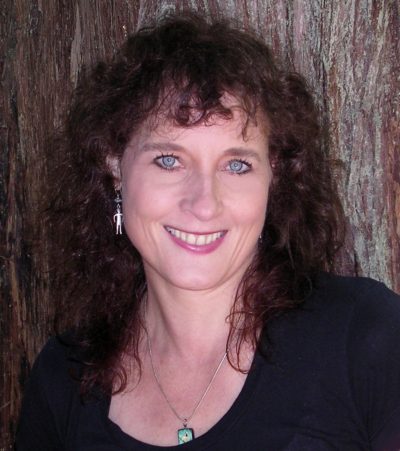 Find Megan’s books here.
Find Megan’s books here.
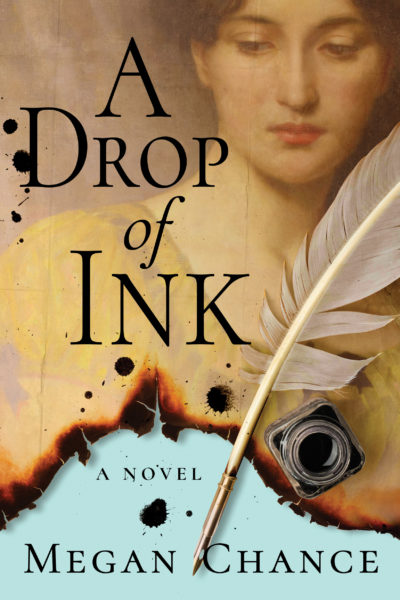
I met Megan recently at Write on the Sound where we presented workshops. We shared a table with her friend author Kristin Hannah at the book signing. And, of course, we got to talking.
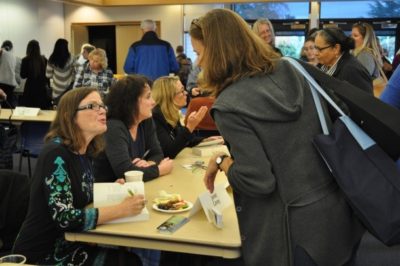
Brave Megan kindly agreed to do a Creative Conversation with me about Beginnings. Novelists face many decisions as we consider where to begin the book. Along with finding the right dramatic moment, we are daunted by the expectations and challenges of those first few lines and pages when we win the reader’s interest or lose them altogether.
Janet: Hi Megan. It’s great to meet up today.
Megan: Hi Janet!
Janet: So, we’re going to talk about beginnings. Question is, where to begin?
Megan: A lot of the old chestnut wisdom is to start “in media res” –that is, the middle of something. I think it’s pretty good advice in general, but it doesn’t necessarily mean begin in the middle of the action–it can mean beginning just before everything changes, just before the event that sets the plot and the character in motion. Too many beginning novelists start with a hefty info-dump of background information. You can weave that stuff through if it turns out the reader really DOES need it to understand what’s going on. I think the most important thing, especially for readers today, is to get into the story quickly.
Janet: It’s all about finding that right dramatic moment that gives just enough information, but not too much. It’s also about creating an emotional connection for the reader. That said, I want to talk a bit about backstory since I think that’s key. You spoke of weaving it in, and I agree. I take time to create dramatic backstories before I begin the book. I need to know Why that character needs to be in the story. And I need to connect to their motivation. Sometimes I err on the side of too much backstory, sometimes too little. In my book In the Time of Dragon Moon, the earlier drafts began “in media res” as she arrives on Dragon’s Keep Isle. Held captive by the Wilde Island Queen, she’s already serving as her personal healer. But my editor wanted me to back up and begin the story with Uma’s abduction from her tribe (a backstory I knew well, but had only mentioned in flashbacks) when she’s taken by force to be the queen’s healer. In this case, the editor was right about starting there. How and when do you weave in backstory Megan?
Megan: That’s really interesting! I can see how the abduction has more drama, though I can also see why you chose to start it when you did. In both cases, you’re creating a story question: why has she been kidnapped? Where is she going? Does she escape? Or, in your original version: how did she come to be there? All of those are interesting questions, and, in terms of which you go with, I guess it depends on whichever one feels most active to you. Which one feels most urgent? The story question is what makes a reader read on–not just your overarching novel question: for example, will Frodo get the ring to Mordor? –but each chapter or scene’s contributing question: how will Frodo escape the ringwraiths? Will he survive the ring?
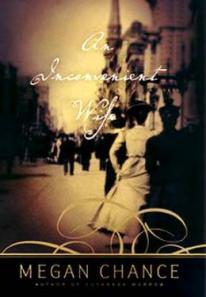 Depending on the book, I weave in backstory either in a flashback chapter, as I did in An Inconvenient Wife, where I felt I needed a chapter of the main character’s courtship with her husband to explain her motivations/feelings, and sometimes I do it in just brief sentences that aren’t meant to completely explain, but to create even more questions–for example: “wizards! She hated wizards ever since that summer on the island.” –which is not the most riveting example, but I think you can see what I’m trying to do with it, which is both provide info and raise another question.
Depending on the book, I weave in backstory either in a flashback chapter, as I did in An Inconvenient Wife, where I felt I needed a chapter of the main character’s courtship with her husband to explain her motivations/feelings, and sometimes I do it in just brief sentences that aren’t meant to completely explain, but to create even more questions–for example: “wizards! She hated wizards ever since that summer on the island.” –which is not the most riveting example, but I think you can see what I’m trying to do with it, which is both provide info and raise another question.
Janet: I like the use of a few short flashbacks, but I also love those interesting sentences that you slip in to hint at something dramatic in the past. Excellent! One of the decisions we face is the first line. So, can we talk about that for a moment? One of my favorites from my books comes from Dragon’s Keep
Mother pulled out her knife. We were alone in the solar.
“It’s time,” she said. “Give me your hand.”
The truth about this opening is that I’d cut roughly 200 pages out of the manuscript before I found the best place to begin, and it was my editor, Kathy Dawson who suggested beginning with that scene in the solar. Do you have any examples of first lines from your books you want to share, and could you tell us why you chose them?
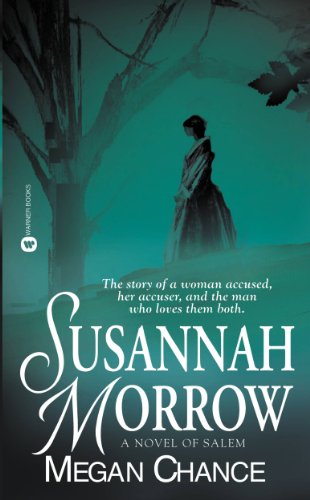 Megan: that’s a great opening! Plunges you right into the action and makes you wonder what’s going on. I often will write way more than I need at the beginning, mostly just to find my way. It’s very freeing to realize that nothing you write has to stay. You can change it, cut it, whatever you want. Too many writers get caught up in that perfect first line. I just try to get into and find the story, and sometimes those original first lines stay and sometimes they don’t.
Megan: that’s a great opening! Plunges you right into the action and makes you wonder what’s going on. I often will write way more than I need at the beginning, mostly just to find my way. It’s very freeing to realize that nothing you write has to stay. You can change it, cut it, whatever you want. Too many writers get caught up in that perfect first line. I just try to get into and find the story, and sometimes those original first lines stay and sometimes they don’t.
The first sentence in Susannah Morrow was “I dreamed the baby died.”
That sentence did not substantially change from the first moment I typed it, and it was always the first line.
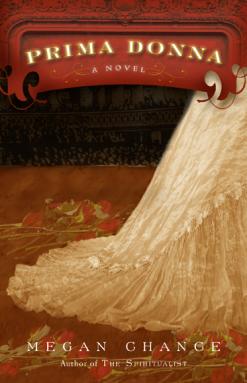 In Prima Donna, I had written the first chapter, and then went back and added a prologue that I don’t explain until nearly the end of the book, so the reader is wondering what it’s all about and what really happened and why, and the rest of the story is really about that prologue. In Bone River, the first line was always going to be: “I was seventeen when the river gave up its bones.” But as the story developed, and the character became older and wiser, that line was put later. Really, I try not to get hung up on first lines or where to begin until I know what I’m doing with the story, and I may not know that for a long time.
In Prima Donna, I had written the first chapter, and then went back and added a prologue that I don’t explain until nearly the end of the book, so the reader is wondering what it’s all about and what really happened and why, and the rest of the story is really about that prologue. In Bone River, the first line was always going to be: “I was seventeen when the river gave up its bones.” But as the story developed, and the character became older and wiser, that line was put later. Really, I try not to get hung up on first lines or where to begin until I know what I’m doing with the story, and I may not know that for a long time.
Janet: Those are powerful first lines, Megan! Both really draw me into the drama and make me long to know more. I’ve noticed how much you’ve been talking about questions. I really like that. I’ve started the practice of stating the story premise in the form of a question– the central question (or quest) of the book. It helps me focus on the core story problem from the start. I also agree that the first draft or first few drafts aren’t the time to worry about nailing the first few pages, (though I fuss over them anyway!). In truth, I usually don’t know the exact dramatic place to begin the story until I’ve completed it. The ending answers the question in the beginning. And since both are deeply connected, the best beginning point isn’t often clear until I’ve written the book. That said, like you, I sometimes land on that “first line” early on and it sticks. In Wenny Has Wings, the first line is; “I died too.” And that one stayed.
Megan: What a great line! I completely agree–the end informs the beginning, and though my subconscious usually knows what it’s doing, my conscious mind is often completely oblivious. It’s always about ⅔ of the way through the book that I start to figure out the reasons I wrote one thing or another. 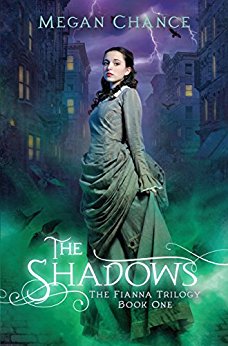 When I was writing my young adult book, The Shadows, my critique partner asked me if I needed the protagonist’s brother, Aidan. All I knew was that I did need him, but I didn’t know why. My subconscious would not let me cut him. It turned out he was an extremely crucial part of the story, but I didn’t know that then. There’s so much you don’t know when you start; I think you have to both be open to everything and trust your gut instinct.
When I was writing my young adult book, The Shadows, my critique partner asked me if I needed the protagonist’s brother, Aidan. All I knew was that I did need him, but I didn’t know why. My subconscious would not let me cut him. It turned out he was an extremely crucial part of the story, but I didn’t know that then. There’s so much you don’t know when you start; I think you have to both be open to everything and trust your gut instinct.
Janet: I so agree about trusting your gut instinct. I often have something a little awkward or strange in the first draft. Something I cannot quite explain, but that I don’t want to toss out for some reason. When questioned about it in critique group, I’m open to cutting it eventually, but I also like to wait and see. What usually happens is that I discover what you discovered about Aidan. It’s a clue to something vital. The subconscious likes to tease with symbols and with mysteries. It’s good to keep an open hand with that. When do you feel like you’ve finally nailed the beginning of a book? Truth be told, I’m always fiddling with it trying to get it “just right” even during the copyedit stage and dare I admit? Even when the book is in galley form! How about you?
Megan: Oh, your copyeditors and proofers must just love you! You know, I am always pretty confident about my endings–those are the things I tend to fiddle with more, just because I always keep in mind something another author once told me: it’s the beginning of the book that makes a reader want to read it, it’s the ending that makes them love it, and want to read the next. The beginnings I’m never completely confident about. I could do them over and over again, but at some point, I just stop. Exhaustion, I suppose. In Bone River, the opening paragraph was the very last thing I wrote.
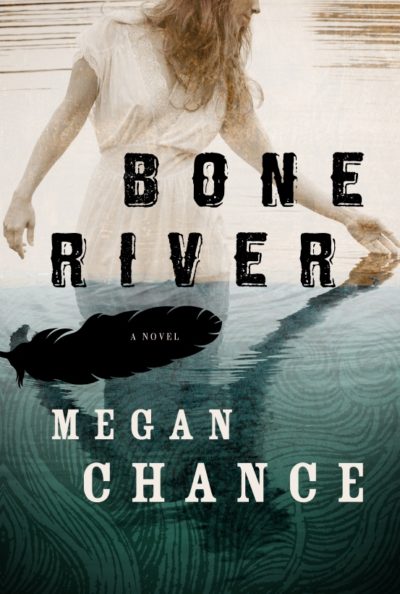 Janet: I can revise opening pages forever! Do you want to share the opening paragraph of Bone River here?
Janet: I can revise opening pages forever! Do you want to share the opening paragraph of Bone River here?
Megan: My mother says the beginning to Bone River is her favorite bit of writing ever–but then again, she IS my mother–
“It was a sacred place, an ancient place. Here was the confluence of river and bay, of sky and forest, salt marsh and slough, the water stretching its fingers far into the land as if it meant always to reclaim it. Here was a presence that gave weight to the fog and the rain, that lingered in the swollen air, even in sunlight, especially in moonlight. A presence I felt, that I’d felt since my father and I had first come here three years ago, drawn by science, by possibility.”
Janet: Okay, that is delicious! Lovely! I’m ready to curl up with the novel right now, Megan. You give me a strong sense of place using the senses, so I feel that I am there. I love to read lines that draw me in that deeply. We readers don’t know the hours of revisions that went into this. We only receive the gift. Thank you!
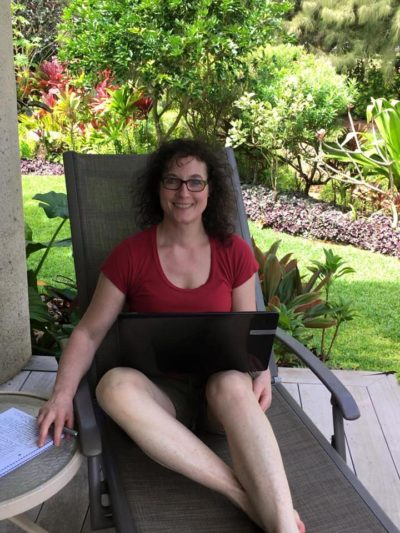 Megan: Thank YOU! I felt a real affinity for the setting, that’s all I can say. But yes, for me, writing is rewriting. I usually do several drafts of a novel. For Prima Donna, I wrote the first 400 pages SIX times before I could go on. But I enjoy the process. I enjoy bringing everything together. I live for that moment when I understand fully and completely why a story has called me to tell it.
Megan: Thank YOU! I felt a real affinity for the setting, that’s all I can say. But yes, for me, writing is rewriting. I usually do several drafts of a novel. For Prima Donna, I wrote the first 400 pages SIX times before I could go on. But I enjoy the process. I enjoy bringing everything together. I live for that moment when I understand fully and completely why a story has called me to tell it.
Janet: Me too. I do a lot of journaling before, during and after writing a book. I’m always asking questions, digging deeper and I usually have some understanding as to why I’m driven to write a story. It usually comes from an aching question that cannot be answered in any other way than through characters (people) living through the problem and coming out the other side. That said, though I have a sense of what I’m after, I’m not satisfied until the characters act and feel and live and discover some kind of ending.
Megan: That’s a good way to put it. It is an ache, and even though it all comes from my brain, I am constantly surprised by how things turn out. There’s a discipline in trying to figure out if a character is acting as he should/needs to, or if his acting in another way would bring you closer to what it is you’re trying to say–which you may not know–or again, whether your subconscious is taking you in a direction you hadn’t anticipated, but one you should pay attention to. It’s really like a great big puzzle all the way through.
Janet: Well put! I’m all for running with the subconscious. I call it my inner storyteller, and she knows a lot more about the story than I do. Sometimes it feels as if the inner storyteller knows all of it and is only revealing it to me a little at a time. Tossing a few crumbs ahead on the trail for me to follow and gobble, then I have to wait in the dark for the next few crumbs.
In terms of openings. What would you say is Most important? Character connection or sense of dramatic story?
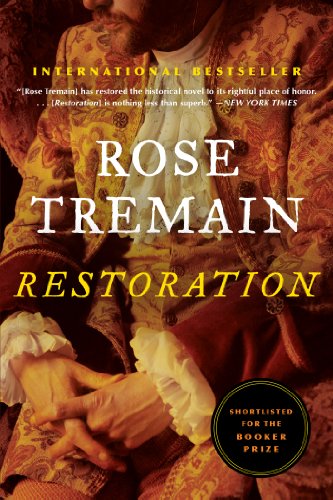 Megan: that’s a hard question. I think it depends on the book. Sometimes a character is unpleasant, and the story is about their change, in which case it’s the drama that pulls you in.
Megan: that’s a hard question. I think it depends on the book. Sometimes a character is unpleasant, and the story is about their change, in which case it’s the drama that pulls you in.
Rose Tremain’s Restoration is a great example of that. I honestly disliked the character intensely for the first half, and it was rather like watching a train wreck–I couldn’t look away. So I don’t think character connection is all important at the start. I think you want two things in an opening: to build a question that a reader wants the answer to, and to create a world where the reader feels he/she is in good hands. If a reader trusts a writer, I think they’re game to play in any world or story you want to show them.
Janet: Very thoughtful answer. You’re right. It depends on the book and upon the character. Thanks for pointing out the two things you find essential for a strong opening–creating a compelling question the reader seeks an answer to and creating a sense of reality of place, or trust in the author’s ability to tell the story. It’s possible that there are millions of ways to begin a story as long as those two things are addressed. I also like to think of the opening as a small mirror reflecting the key elements of the story in some way, or at least hinting at them.
Which book of yours, if any, did you find the most difficult to begin? And what did you learn from the struggle? (Aside from how exhausting openings are!)
Megan: Okay, this is an interesting thing–I had a very tough year this year in terms of writing. I started one book, worked on it for eight months before I finally realized that, for whatever reason, I wasn’t ready to write it. And you know what? I couldn’t start it. I could not find the way to begin. I wrote the first 200 pages over and over again–I think five or six drafts–and in each case, I began again with a new set of characters, trying to find my way through. I couldn’t do it, and thus it is sitting in a drawer (or actually, on a USB drive) for the foreseeable future. I think it all comes down to that beginning, which should have told me that my vision for the book was still too unformed. I couldn’t grasp it. What did I learn? To listen to my instincts before spending eight months spinning my wheels. I’ve never had the experience where I just could NOT get to where I wanted to be.
Janet: That’s so hard and so frustrating and I completely relate! I suspect many novelists do. I hope the tale that’s waiting is underground like a seed, and that at some point, the first shoot that’s strong and core, will appear. Brave of you to set it aside and wait. That’s very hard for me to do. I circled through the first 175 pages of the novel I’m working on now over and over and over, and, of course, I’ve rebegun (a word? If not, it should be!) the beginning chapters, but I finally got past those first 175 and I’m heading into a dramatic flood scene, which I’m terrified to write by the way. I’m aware the opening of the book still needs work, still needs cutting and shaping, but for now, I’m swimming into the flood. You are brave to begin again.
Megan: I don’t think it was bravery so much as desperation. I have never written a book where at some point I didn’t ask myself what I was doing, or think it was terrible, or feel desperate. The difference with this book was that usually, in each draft, something carries through. Some character, some thread, something. In this, that wasn’t true. I could keep throwing out and starting anew. Nothing carried through. I was interested in nothing enough to keep writing about it. I fought that for a long time; not only is the subconscious a help, it also likes to mess with you a lot. So it was hard to tell if I was just afraid and messing with myself (which I think was true to an extent) or whether it was truly that I was never going to grasp it. I still don’t know which is true. I do know, however, that ideas never go away. They sit waiting for the right time, just like your seed.
Janet: You created characters and character relationships. They may reappear in some unexpected way. I like to think that nothing is wasted. I wrote a rescue scene in one book — one the editor asked me to cut—and later used the same scene with a few changes in another book. Ha! And I understand about the “muse” or subconscious. It’s one thing to have the inner storyteller toss out interesting puzzle pieces she knows I can form into a book (if I work my butt off to do it) Another thing for the subconscious to throw out interesting, confusing and downright frustrating puzzle pieces that will NOT form into a whole!
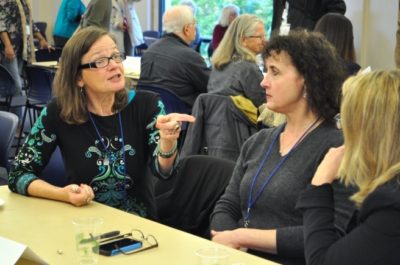 (Photo of Janet ranting at WOTS)
(Photo of Janet ranting at WOTS)
Megan: You’re right, of course. Characters and situations keep popping up again, and you’re right as well that nothing is ever wasted. I try to look at it that way (it’s necessary to look at it that way to remain sane!) because otherwise it’s too frustrating and a bit nihilistic. The ghosts of things remain in your words and in the choices you make. It’s a bigger fear for me that I’m constantly plagiarizing myself. 🙂
Janet: FEAR — welcome to the writer’s world, yes? By the way, I love the line: The ghosts of things remain. Feels like a story there.
Megan: Ha! I think fear is a requirement for every writer. But the ghost thing–I firmly believe that. With each draft, you discover something new, and even if you cut that draft, what you wrote and learned informs the whole. It can’t help it. A book is a palimpsest.
Janet: I’m not quite as brave as you are about throwing drafts out and starting again. I tend to keep, edit, revise, cut, and yes, toss, but not the whole thing. How do you do that?
Megan: I just have faith that I can. I’m just taking different routes to get to the same place, but I’ve written enough books that I know I’ll get there. Things DO stay from one draft to another, and each subsequent revision brings me closer and closer to what I want it to be. But yes, what matters is knowing that I can’t make it worse; I can only make it closer to my vision. It’s really just as I said, faith that I can pull it off if I work hard enough.
Janet: One of my biggest fears is that I can’t pull it off. But each time, after many revisions, I somehow manage it. I’m grateful to be doing this work. To be given stories I feel called to write. I used to end my classes with. “Write as if your characters’ lives depended upon it.” because they do.
Megan: I love that! Because they do, indeed.
Janet: Thank you so much for talking with me about beginnings and sharing so much about your creative process, Megan.
Megan: You’re so very welcome. I enjoyed it! Thank you for having me.

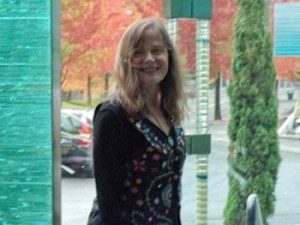



So much to take away here, to ponder and to fuel. And perfect timing for me, since I’m shuffling around Page 1 of a new book, after a very long time away from story making. Thank you, Megan and Janet, I really enjoyed ‘sitting in’ here.
Thanks for stopping by and “sitting in” Wendy. Good luck with your first page and beyond. You can do this!
Janet
Thanks for this interveiw. Very enlightening. And to read how you sliced off 200 pages in Dragon’s keep to find the true beginning is both horrifying and comforting. maybe what we perceived as “failed” stories are just tales beginning in the wrong place.
Good point, Laura M my friend.